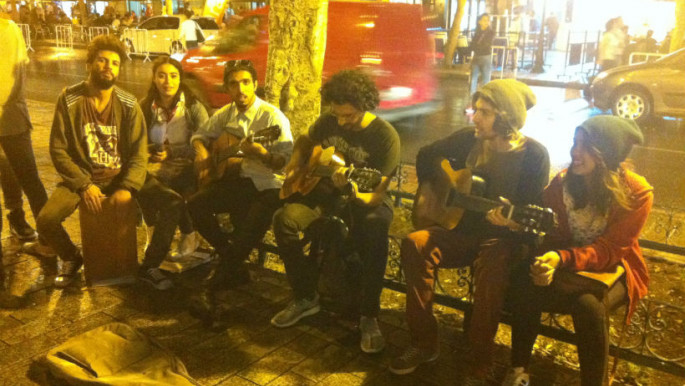
New Tunisian scenarios: Reflections from Carthage
Hadani Ditmars has been attending the Carthage Film Festival on behalf of The New Arab. Catch up with her tales of adventure and insomnia in her earlier dispatches: The red carpets and silver screens of Carthage and The Carthage film festival on very little sleep.
The next morning, I awake, refreshed, after a whole six hours of sleep at the 115-year-old Hotel Majestic.
Located on the Avenue de Paris, in the old Jewish quarter, right next to the streetcar queue, I am told by Monsieur Abdullah, purveyor of excellent breakfasts - dates bathed in olive oil and thick Tunisian yoghurt - that the building was occupied by the Germans in the Second World War.
The ghosts of several wars, and many celebrations, breathe through its still-handsome corridors. Here, the pounding of distorted drum machines has been replaced by the gentler rumble of the streetcar.
Today I am invited to attend a special ceremony for the induction of festival president and former film-maker Ibrahim Letaif, at the residence of the French ambassador in La Marsa. His home is a gorgeous old Ottoman villa near the seaside, that transports me from gritty downtown Tunis to a world of luxe, calme et volupte.
As I wander through the gardens and quaff champagne and canapés with assorted guests, I try not to think about the brutality of French military campaigns, past and present, in North Africa. Instead, I photograph the exquisite Ottoman arabesques and tile work, and marvel at the orange trees.
I meet actor Hisham Rostrom, star of the opening night Fleur d’Aleppo, and his actress wife Sana, who suddenly invite me to a Sufi music festival to be held soon in the south - subject to security issues and prevailing government winds.
They also invite me to a party that evening in honour of Rostrom's co-star, Hind Sabri, to be held at the very same disco that tormented me for two whole nights.
 |
| Songs of freedom: Young musicians perform on the street at the Hotel Africa [Hadani Ditmars] |
A young festival volunteer kindly takes me for a seaside walk, passing multi-million dinar villas, and takes photographs of me wading in the Mediterranean waters, communing with the sea where my ancestors fled to the new world over a century ago. It's Elia Kazan's America, America meets a Claudia Cardinale film.
He tempts me with a trip to Sidi Bou Said, but, as a faithful cinephile, I must return for a date with a young Tunisian film critic, to watch a trilogy of courts metrages by Merzak Allouache from 1972. Nader was a student of Ferid's and is now finishing a doctorate in Tunisian cinema at the Sorbonne.
He is the same age as I was when I first came to the festival in 1994 and was also a young film critic living in Paris and writing dispatches for Sight and Sound and Screen International on African and Arab cinema.
As we watch a short film about a thwarted affair in 1930s Tunis and a longer feature called The Picnic set in second world war-era Tunisia, young filmgoers chat and play with their mobile phones, indifferent to the images on the screen. But Le Picnique proves a gem.
A charming road movie about war time nouveau riche black market profiteers off for a Sunday jaunt with their poor-but-respectable cousin, it also boasts some key colonial metaphors. When the smuggler's car breaks down mid-journey and the lunch is spoiled, a French man stops to "help", but ends up making things worse, and then abandoning the Tunisians in the desert.
After the film, Nader and I wander back to the Hotel Africa, and meet Ferid himself en route. When we ask what happened to the third short film in the trilogy he tells us that the state archivist who restored the trilogy was so influenced by a French film critic's panning of the second film that he simply cut it out of the series.
I remind Ferid that, when we met in 1994, he wanted to cast me in Un Ete a La Goulette, but that sadly my Arabic wasn't up to scratch. Two decades later, as I wander the streets of Tunis with the young film critic half my age he humours me. "Next time," he smiles.
Nader walks me back to the Majestic, past a street named for Martin Luther King, and newly opened cafes near the national theatre.
"This was a place where there were many demonstrations against Ben Ali," Nader, who was 21 at the time of the revolution, tells me.
As we take coffee on the hotel terrace, the waiter eyes me suspiciously and speaks to me in Tunisian Arabic. When he learns I am Canadian his tone becomes friendlier. As night falls, Nader tells me that two of his school friends from Sousse died as jihadists in Syria.
He tells me that, during the first few years after the revolution there was a plethora of documentaries by young film-makers eager to celebrate their newfound freedoms. But now, there is a kind of wait-and-see attitude prevailing. While many films have been made about the bad old days of Ben Ali, more current scenarios are still being pondered.
Soon our conversation will end, and I will take a taxi back to my old hotel with adjacent disco, and meet film stars fresh from the surgeon's knife. But for now, on the balcony of the Hotel Majestic, my romance with Tunisia begins again in earnest. The distance between the screen and the street is already starting to fade. What new scenarios await?
Stay tuned for Hadani's final dispatch from the Carthage Film Festival. In the meantime, follow her on Twitter: @HadaniDitmars





 Follow the Middle East's top stories in English at The New Arab on Google News
Follow the Middle East's top stories in English at The New Arab on Google News


